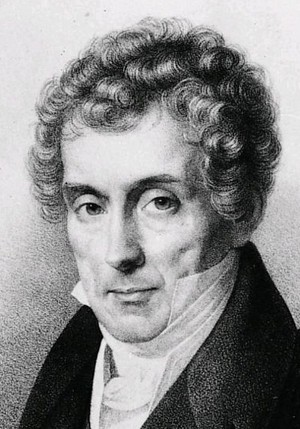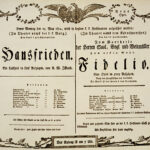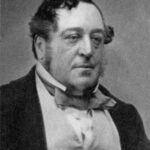Luigi Cherubini had great influence on Beethoven. Who was Cherubini and what opinion he had of Beethoven? Read on to find out!
Who was Cherubini – a short bio
Luigi Cherubini (in full Maria Luigi Carlo Zenobio Salvatore Cherubini) was born September 14, 1760, Florence, Italy and died March 15, 1842, Paris, France. His exact date of birth is debated, there is strong evidence that the day was rather the 8th of September (it was a tradition to name a child Maria born on this day).
His formal education in music began at the age of six by his father Bartolomeo who was a master harpsichord player. The child’s gift was evident from the start. By the age of thirteen he was done composing several religious works.
In 1780 he was awarded a scholarship to learn music in Milan and Bologna. His first operas followed the contemporary opera style, being noble and serious in tone (opere serie). Cherubini, eager to experiment and open to new ideas, left Italy and moved to London in 1785. Here he produced three operas, two of them in serie and one in buffa (comic).
|Related: A short history of Italian and German opera
Soon he visited Paris, where he was introduced to Parisian society, and even to Marie Antoinette the Queen of France, by famous violinist friend Viotti. With the exception of some short excursions he spent the rest of his life in France.
The French Revolution affected him greatly. Having strong connections to the former aristocracy made him an easy target and he was constrained to cooperate with the new government. They say Napoleon found him too complex, still he was popular and composed patriotic operas on a yearly basis. He even was appointed as director of music in occupied Vienna, in 1805.
In later years he focused more on church music partly because audiences in Paris favoured younger composers. In 1822 he was appointed as the head of the Conservatoire de Paris.
Cherubini died at the age of 81, in 1842. He was buried in Paris, in Père Lachaise Cemetery, only a few metres from his friend Chopin.
The meeting between Cherubini and Beethoven
In July of 1805 Cherubini arrived to Vienna. At the time Beethoven was secluded at Hetzendorf, most probably working on the score of his opera, Leonore. A party was organized sometime later that month at Sonnleithner’s place. Invited musicians included Cherubini, Beethoven and German organist and composer Vogler. They all played for entertainment, first Vogler.
|Related: Beethoven’s only opera: Leonore or Fidelio?
There are two kinds of contradicting accounts about the gathering and the mood between Cherubini and Beethoven. One account recalls Beethoven was respectful and paid much attention to his admired fellow composer. The other, by Czerny, says “B. did not give Cherubini a friendly reception in 1805, as the latter complained later.”
Today, it is not possible to know for certain which one is the true version. However, given the fact that Beethoven regarded Cherubini highly, this magazine opts for the first account.
Cherubini’s opinion of Beethoven
There is one record of conversation from Schindler, involving Cramer and Cherubini in 1841, discussing the piano play of Beethoven. Cherubini supposedly said his play was rough. Cramer had a more positive memory.
In this both opinions can be valid and correct. First, music and how it is played by a piano player is a matter of taste. But, more importantly the two musicians met him five years apart and by the time Cherubini had the pleasure to hear him play in 1805 his hearing and thus his ability to play the piano deteriorated considerably.
|Related: At what age did Beethoven go deaf?
Another occasion when Cherubini made his opinion clear on Beethoven and his music was about the opera, Leonore. Allegedly he said, “the overture that because of its confusion of modulations I was unable to recognize the principal key.” and “I had come to the conclusion that till then Beethoven had paid too little heed to the art of singing, for which Salieri was not to blame.”
|Related: Salieri and Beethoven
Here we must underline the fact that the overture Beethoven wrote for Leonore was probably too novel and grand in substance, and audiences, including Cherubini who must have heard the opera during his stay in Vienna, failed to comprehend it in full.
As social demeanour of Beethoven goes Madame Cherubini had the following recollection. “…in mixed society his conduct was reserved, stiff and marked by artist’s pride; whereas among his intimates he was droll, lively, indeed, voluble at times, and fond of giving play to all the arts of wit and sarcasm, not always wisely especially in respect of political and social prejudices.” To this she was able to add much concerning his awkwardness in taking hold of such objects as glasses, coffee cups, etc. At this point Cherubini added, “Toujours brusque!” (Always abrupt).
Another famous incident involves Baron de Trémont, a French music-loving diplomat. He was about to visit occupied Vienna and asked Cherubini for a letter of introduction he could show to Beethoven. Cherubini refused, saying, “I will give you one to Haydn and that excellent man will make you welcome, but I will not write to Beethoven. I should have to reproach myself that he refused to receive someone recommended by me. He is an unlicked bear!”
Finally, one more recollection by Schlesinger, son of the Berlin publisher. He reported Cherubini saying to his pupils in Paris that “The greatest musical minds that ever lived or ever will live, are Beethoven and Mozart.”
Beethoven’s opinion of Cherubini
Beethoven admired Cherubini’s music and was greatly impressed. Not only listening to, but he used some ideas from Cherubini in his own works. One example is his Fifth Symphony, where many believe, he used ideas from Cherubini’s Hymne du Pantheon.
Cipriani Potter, an English musician, often accompanied Beethoven in his walks in and out of Vienna. Once the young man asked the Master, “Who is the greatest living composer, yourself excepted?” Beethoven stopped for a moment thinking, then exclaimed: Cherubini!
After the burial of Beethoven two requiems were played. One was Mozart’s and two days later Cherubini’s, at the Karlskirche.





